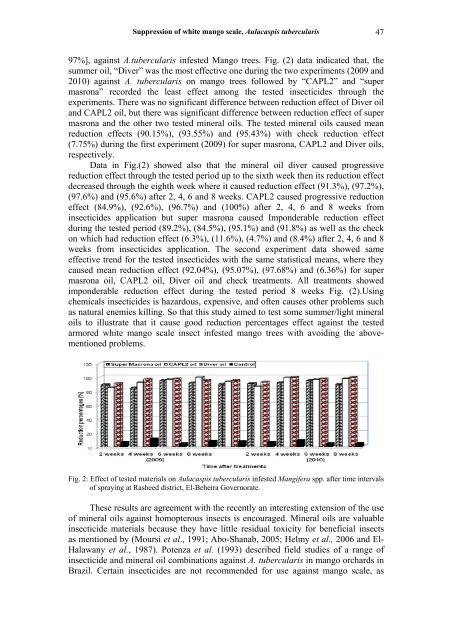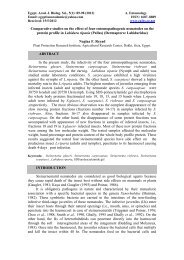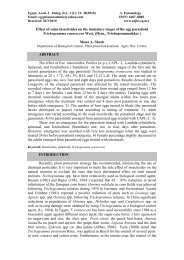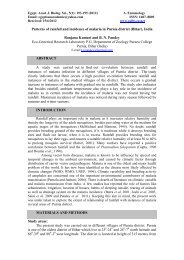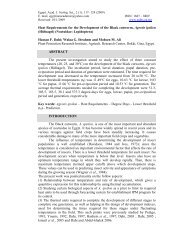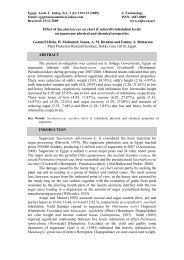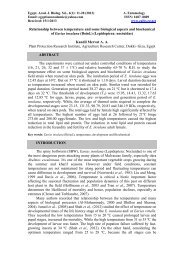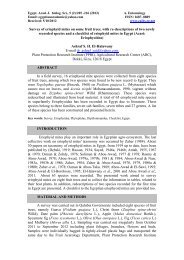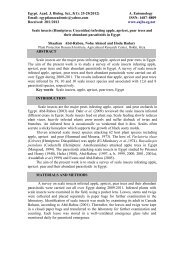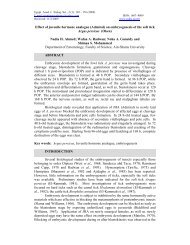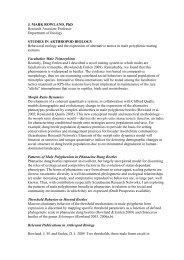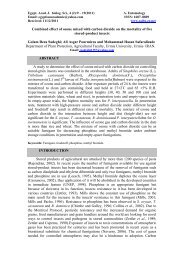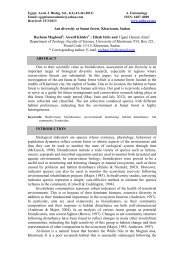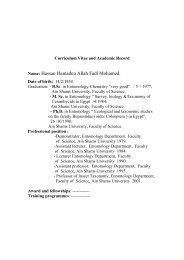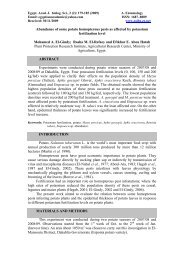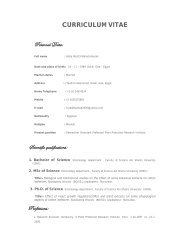Suppression of white mango scale, Aulacaspis tubercularis ...
Suppression of white mango scale, Aulacaspis tubercularis ...
Suppression of white mango scale, Aulacaspis tubercularis ...
Create successful ePaper yourself
Turn your PDF publications into a flip-book with our unique Google optimized e-Paper software.
<strong>Suppression</strong> <strong>of</strong> <strong>white</strong> <strong>mango</strong> <strong>scale</strong>, <strong>Aulacaspis</strong> <strong>tubercularis</strong> 47<br />
97%], against A.<strong>tubercularis</strong> infested Mango trees. Fig. (2) data indicated that, the<br />
summer oil, “Diver” was the most effective one during the two experiments (2009 and<br />
2010) against A. <strong>tubercularis</strong> on <strong>mango</strong> trees followed by “CAPL2” and “super<br />
masrona” recorded the least effect among the tested insecticides through the<br />
experiments. There was no significant difference between reduction effect <strong>of</strong> Diver oil<br />
and CAPL2 oil, but there was significant difference between reduction effect <strong>of</strong> super<br />
masrona and the other two tested mineral oils. The tested mineral oils caused mean<br />
reduction effects (90.15%), (93.55%) and (95.43%) with check reduction effect<br />
(7.75%) during the first experiment (2009) for super masrona, CAPL2 and Diver oils,<br />
respectively.<br />
Data in Fig.(2) showed also that the mineral oil diver caused progressive<br />
reduction effect through the tested period up to the sixth week then its reduction effect<br />
decreased through the eighth week where it caused reduction effect (91.3%), (97.2%),<br />
(97.6%) and (95.6%) after 2, 4, 6 and 8 weeks. CAPL2 caused progressive reduction<br />
effect (84.9%), (92.6%), (96.7%) and (100%) after 2, 4, 6 and 8 weeks from<br />
insecticides application but super masrona caused Imponderable reduction effect<br />
during the tested period (89.2%), (84.5%), (95.1%) and (91.8%) as well as the check<br />
on which had reduction effect (6.3%), (11.6%), (4.7%) and (8.4%) after 2, 4, 6 and 8<br />
weeks from insecticides application. The second experiment data showed same<br />
effective trend for the tested insecticides with the same statistical means, where they<br />
caused mean reduction effect (92.04%), (95.07%), (97.68%) and (6.36%) for super<br />
masrona oil, CAPL2 oil, Diver oil and check treatments. All treatments showed<br />
imponderable reduction effect during the tested period 8 weeks Fig. (2).Using<br />
chemicals insecticides is hazardous, expensive, and <strong>of</strong>ten causes other problems such<br />
as natural enemies killing. So that this study aimed to test some summer/light mineral<br />
oils to illustrate that it cause good reduction percentages effect against the tested<br />
armored <strong>white</strong> <strong>mango</strong> <strong>scale</strong> insect infested <strong>mango</strong> trees with avoiding the abovementioned<br />
problems.<br />
Fig. 2: Effect <strong>of</strong> tested materials on <strong>Aulacaspis</strong> <strong>tubercularis</strong> infested Mangifera spp. after time intervals<br />
<strong>of</strong> spraying at Rasheed district, El-Beheira Governorate .<br />
These results are agreement with the recently an interesting extension <strong>of</strong> the use<br />
<strong>of</strong> mineral oils against homopterous insects is encouraged. Mineral oils are valuable<br />
insecticide materials because they have little residual toxicity for beneficial insects<br />
as mentioned by (Moursi et al., 1991; Abo-Shanab, 2005; Helmy et al., 2006 and El-<br />
Halawany et al., 1987). Potenza et al. (1993) described field studies <strong>of</strong> a range <strong>of</strong><br />
insecticide and mineral oil combinations against A. <strong>tubercularis</strong> in <strong>mango</strong> orchards in<br />
Brazil. Certain insecticides are not recommended for use against <strong>mango</strong> <strong>scale</strong>, as


